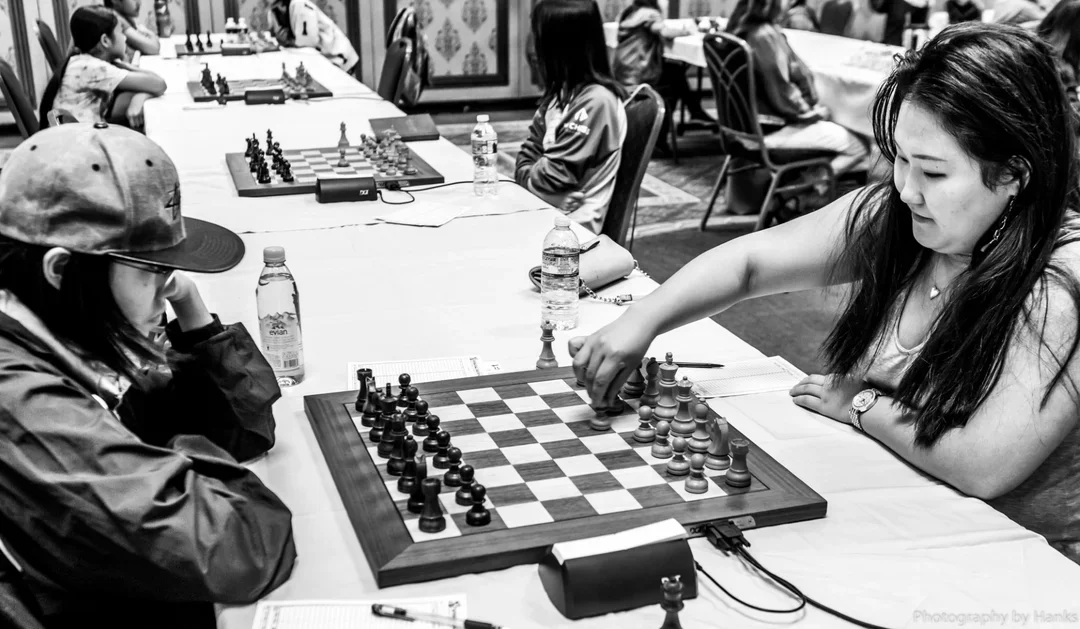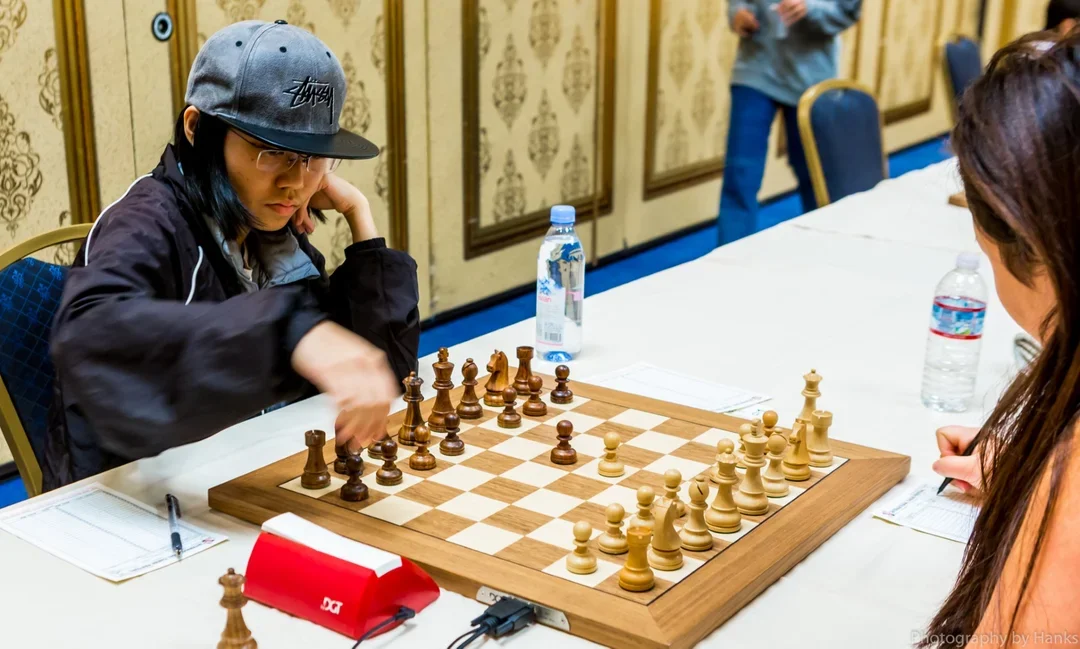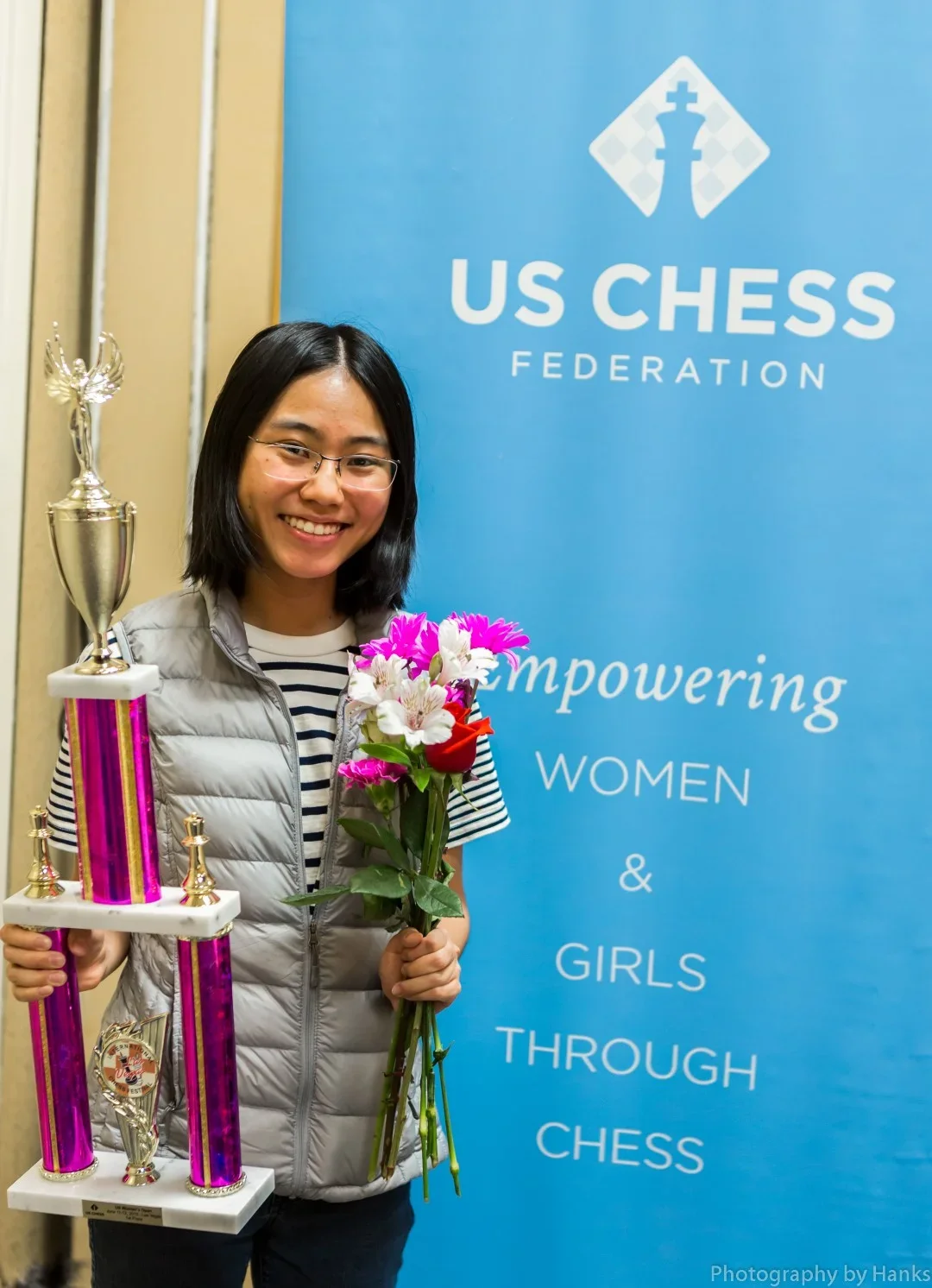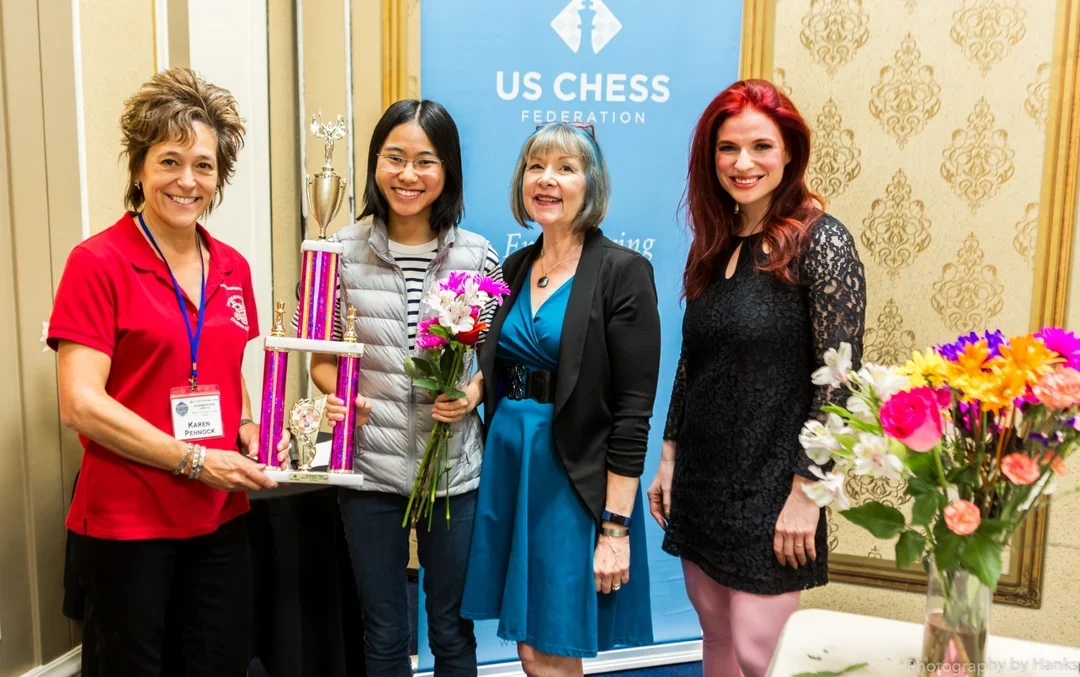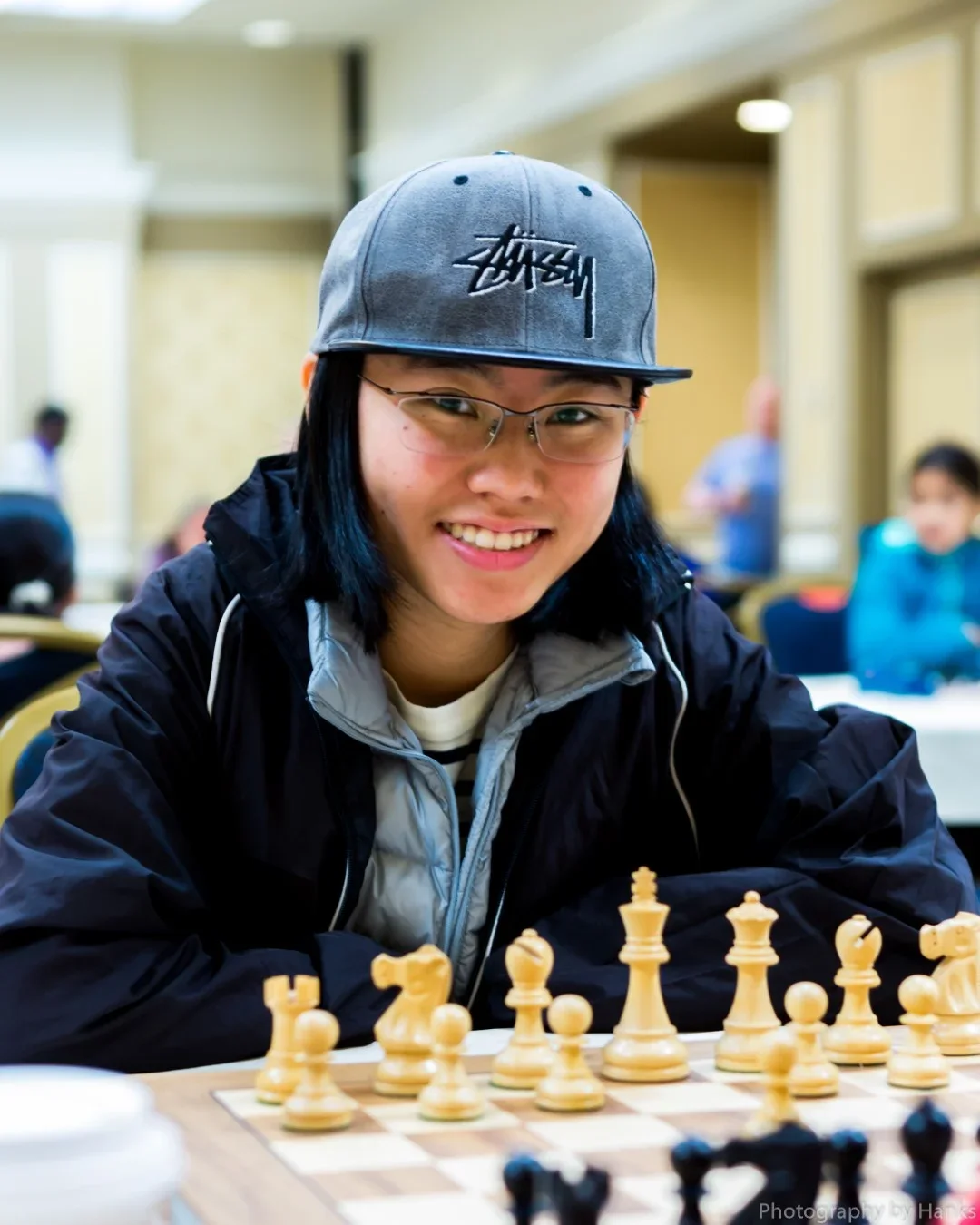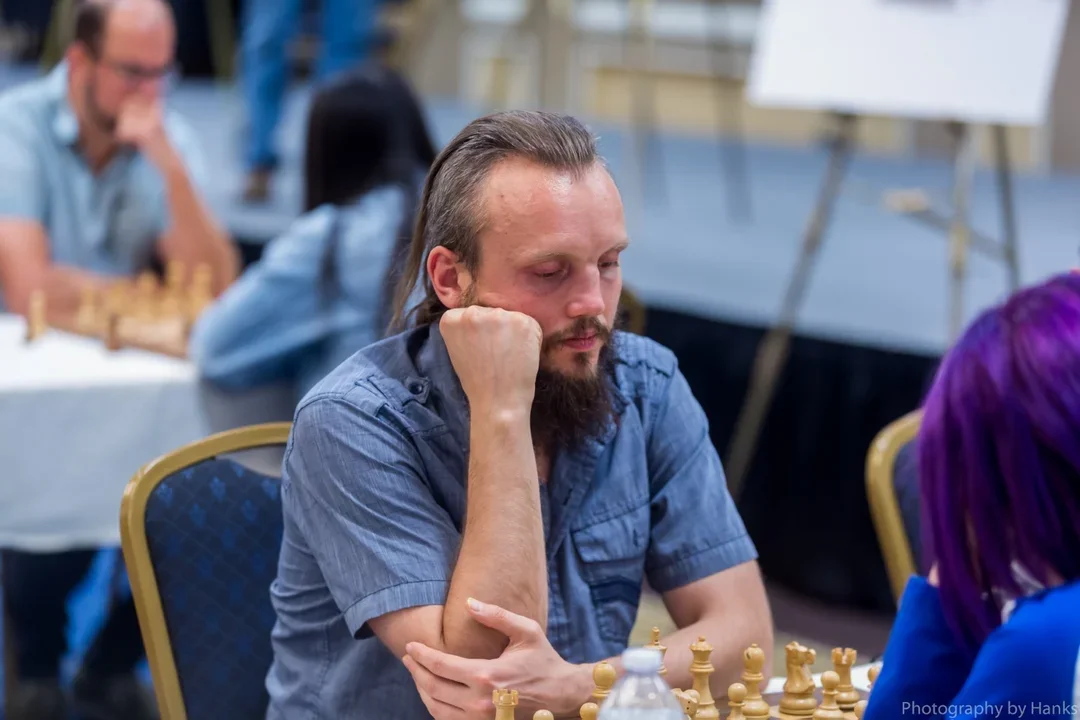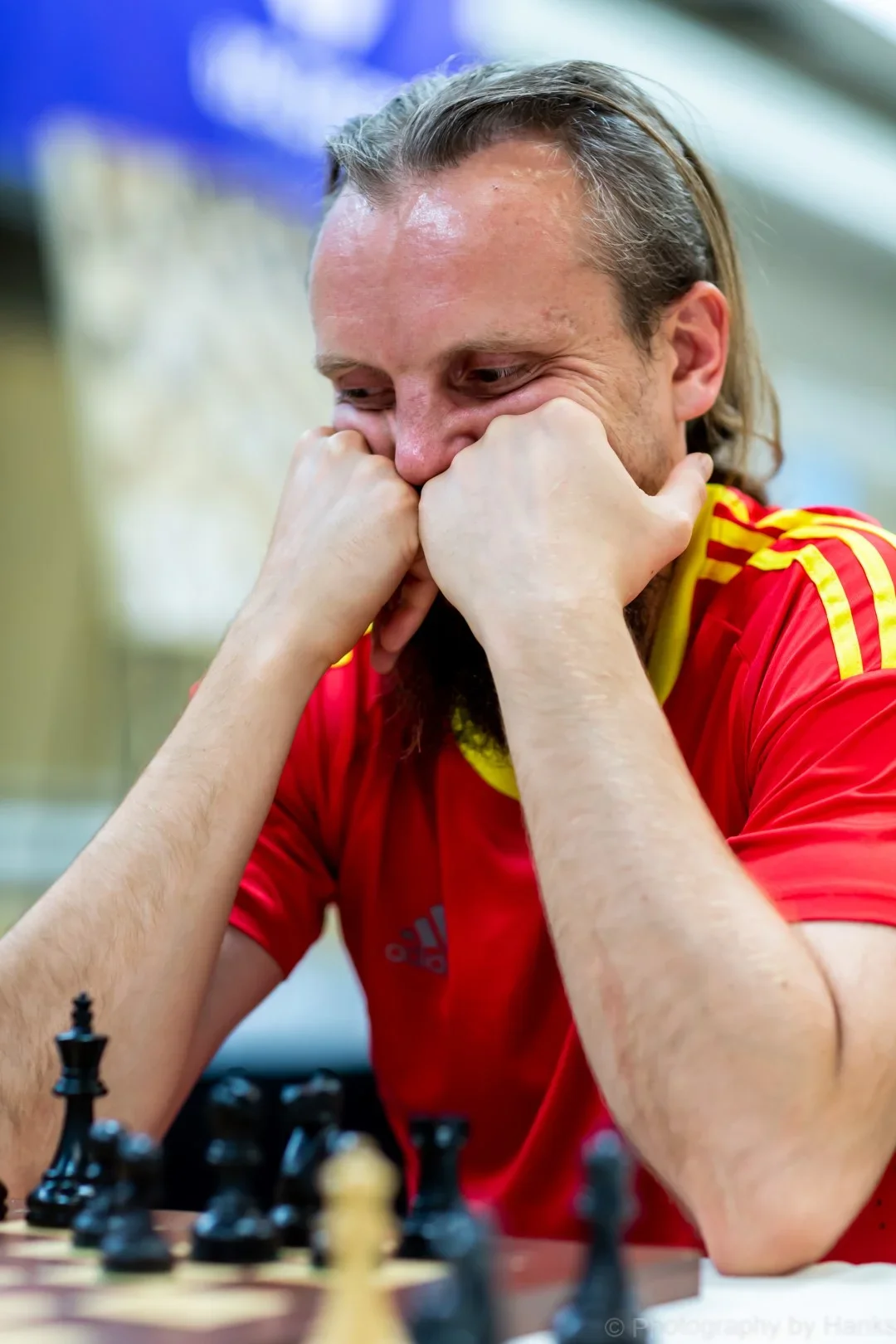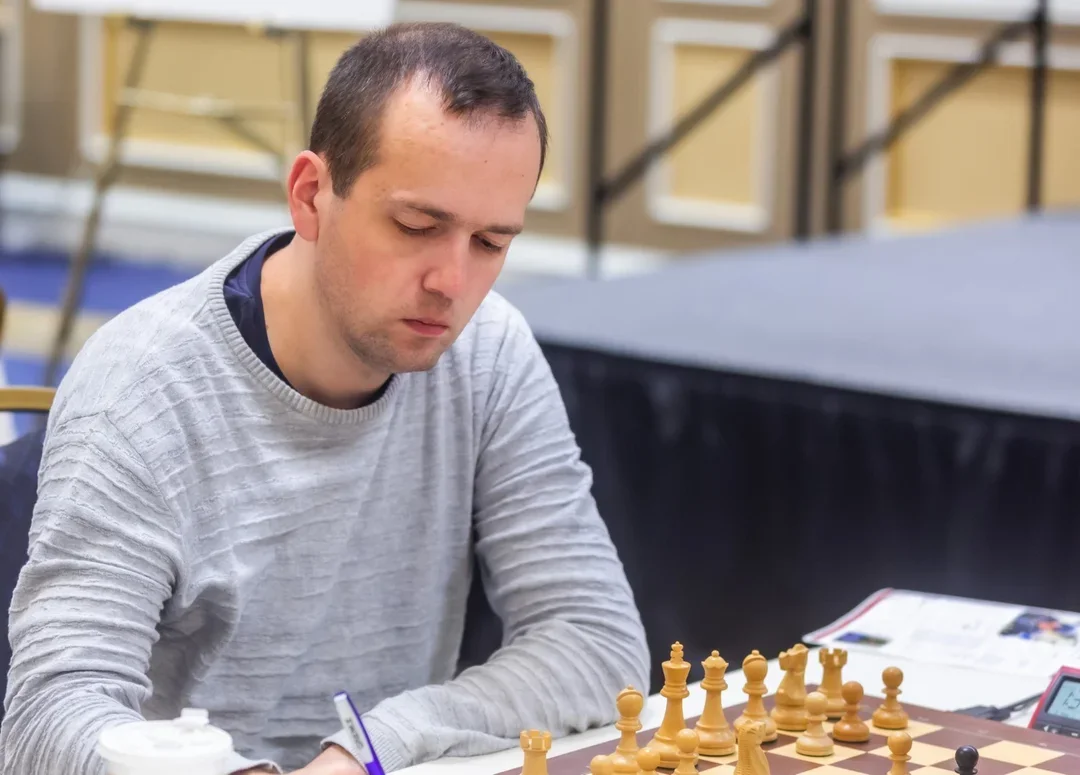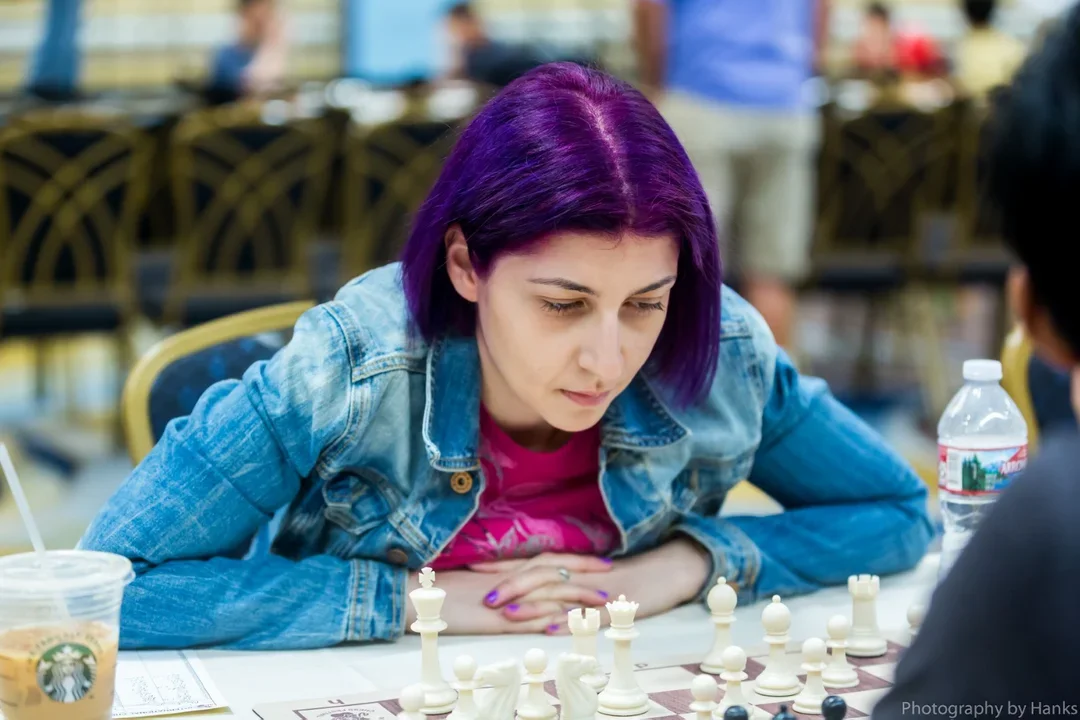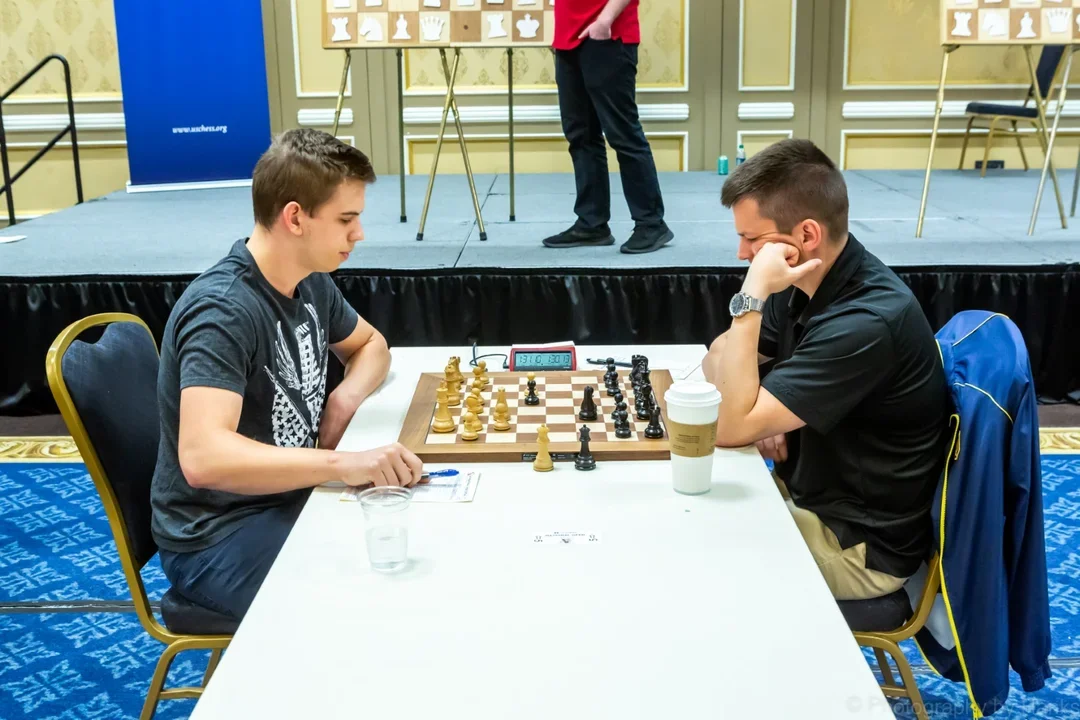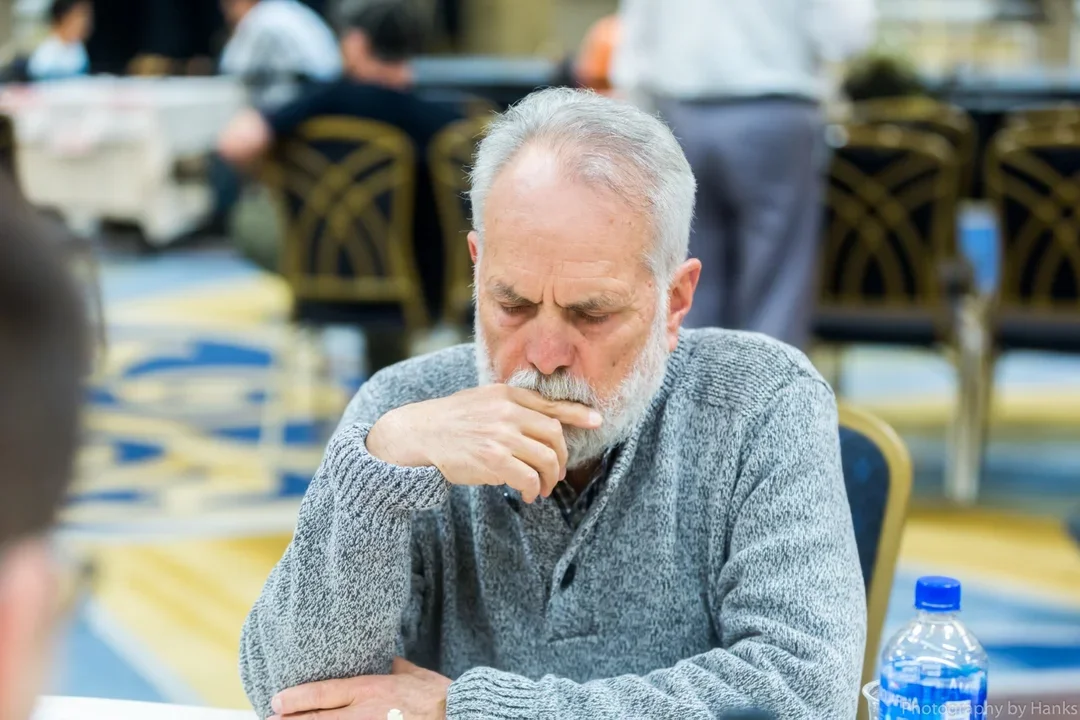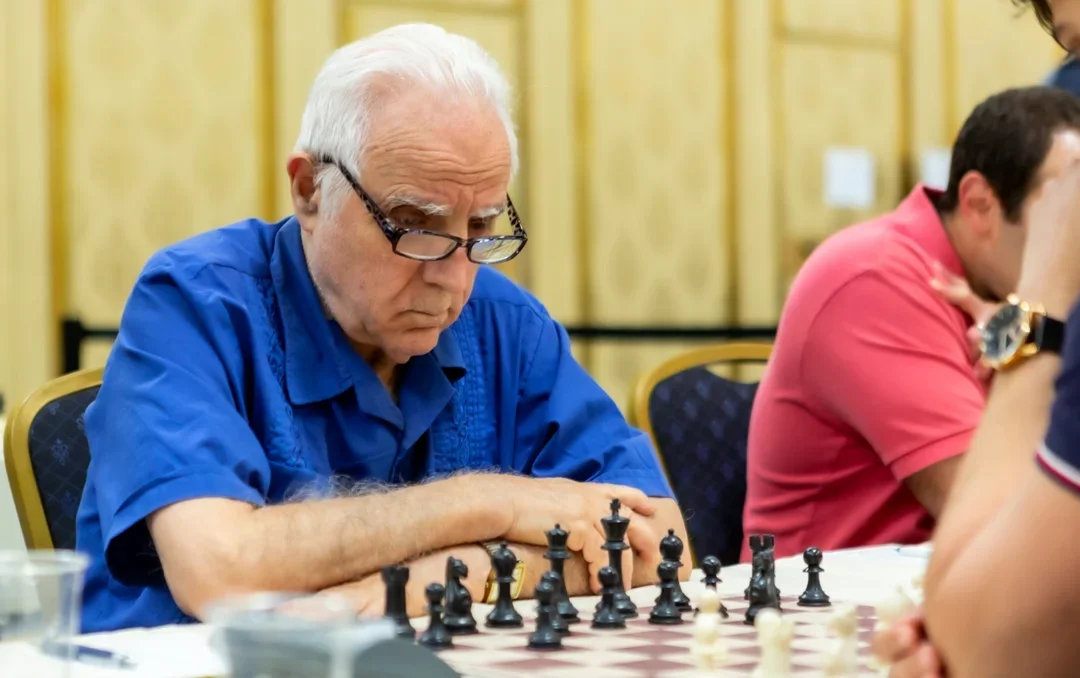The National Open has been a premier US event since 1965, and this year’s edition, held on June 11 to 16th, brought with it a number of new features.
The Open is the centerpiece of the broader Las Vegas International Chess Festival, which included many tournaments, among them the U.S. Women’s Open, the International Youth Championship, the Youth Trophy Tournament, and a wide assortment of Blitz and Action tournaments. Numerous side events were also held, including a Grandmaster chess camp, simultaneous exhibitions by Grandmaster Fidel Corrales and WGM Jennifer Shahade, and lectures by leading players.
The Open was first established by Ed Edmondson in 1965 and moved to Las Vegas in 1983. Alan and Janelle Losoff organized this year’s event, Alan’s 29th consecutive effort, with co-sponsorship by the Las Vegas Chess Center. For the first time, the top section was a 9-round FIDE norm event, which attracted a number of extremely strong and ambitious younger players.
The 2019 U.S. Women’s Open was won by WIM Megan Lee, who scored 4.5/5 to take clear first. Second place was shared by WGM Carla Heredia, WFM Joanna Liu, and Nadiia Salakh. Lee’s decisive victory came in the last round versus last year’s Champion Saikhanchimeg Tsogtsaikhan:
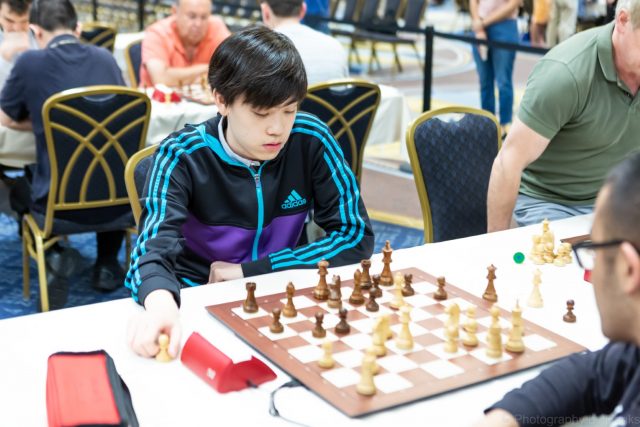 Andrew Tang (photo Tim Hanks)
GM Andrew Tang won the Walter Browne Memorial Blitz tournament ahead of several GMs. Tang also finished second in the 10-GM round robin Spirit of Chess Blitz tournament, trailing winner GM Igor Kovalenko by two full points.
Andrew Tang (photo Tim Hanks)
GM Andrew Tang won the Walter Browne Memorial Blitz tournament ahead of several GMs. Tang also finished second in the 10-GM round robin Spirit of Chess Blitz tournament, trailing winner GM Igor Kovalenko by two full points.
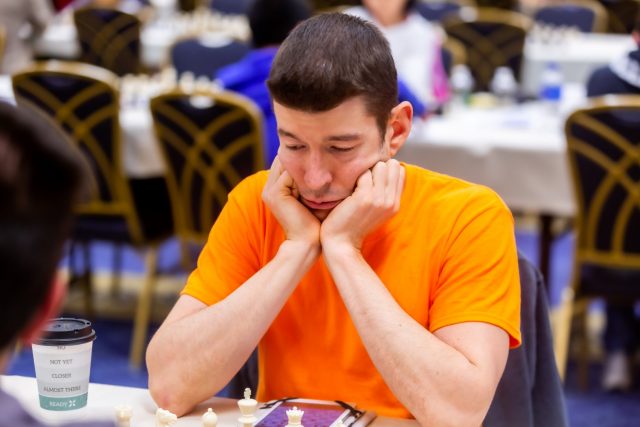 Eugene Yanayt (photo Tim Hanks)
In the Open Section, the first rounds saw a couple of notable upsets, with Annie Wang defeating Alexander Shabalov, and FM Eugene Yanayt defeating GM Andrey Baryshpolets in Round 1 as follows:
Eugene Yanayt (photo Tim Hanks)
In the Open Section, the first rounds saw a couple of notable upsets, with Annie Wang defeating Alexander Shabalov, and FM Eugene Yanayt defeating GM Andrey Baryshpolets in Round 1 as follows:
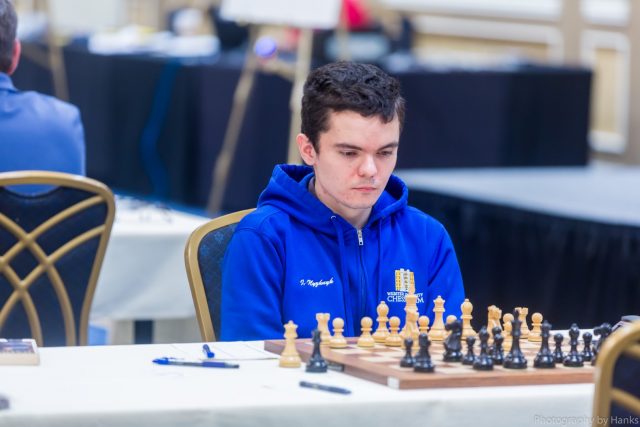 Illya Nyzhnyk (photo Tim Hanks)
The eventual winner showed his professional approach in the following Round 2 game, being perfectly willing to enter an even endgame and see what happens:
Illya Nyzhnyk (photo Tim Hanks)
The eventual winner showed his professional approach in the following Round 2 game, being perfectly willing to enter an even endgame and see what happens:
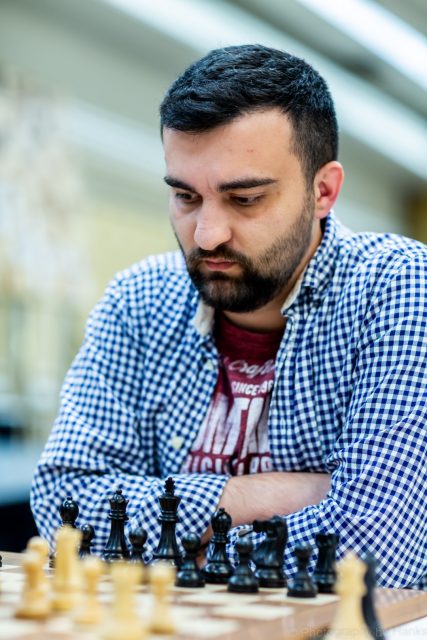 Igor Kovalenko (photo Tim Hanks)
Another important contest from Round 7 pitted GM Chirila versus GM Kovalenko. Black played a strategically creative opening which led to complex play and finally, some nice tactics:
Igor Kovalenko (photo Tim Hanks)
Another important contest from Round 7 pitted GM Chirila versus GM Kovalenko. Black played a strategically creative opening which led to complex play and finally, some nice tactics:
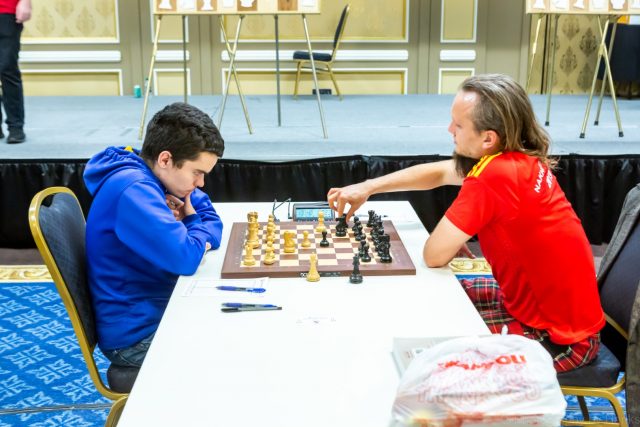 Nyzhnyk-Gareyev (photo Tim Hanks)
The ultimate beneficiary of top-board draws was Illya Nyzhnyk, who defeated Timur Gareyev and took first place alone. The game wasn’t terribly remarkable, but was nevertheless the most important one of the tournament:
Nyzhnyk-Gareyev (photo Tim Hanks)
The ultimate beneficiary of top-board draws was Illya Nyzhnyk, who defeated Timur Gareyev and took first place alone. The game wasn’t terribly remarkable, but was nevertheless the most important one of the tournament:
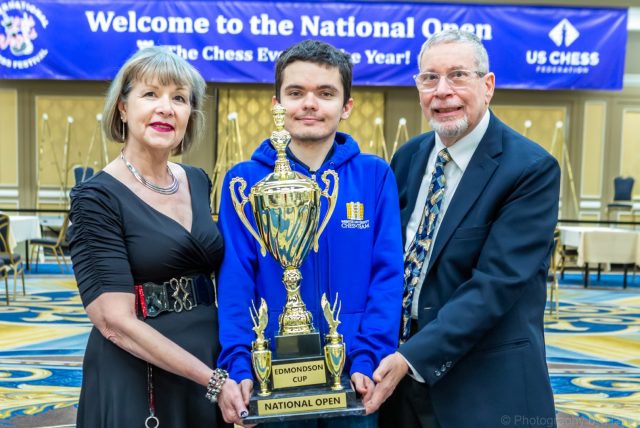 Janelle Losoff, Nyzhnyk, Al Losoff (photo Tim Hanks)
This win was worth $8000 to Nyzhnyk. Illya is a Ukranian who graduated last year from Webster University. He plays a lot in the U.S., winning last year’s World Open, and has gained 50 FIDE rating points over the past 12 months. At only 22 years old, he will definitely be a player to watch as he contends with the world’s elite players over the coming years.
Amazingly, almost every other section of the main event (the Open) produced a clear winner. Joshua Grabinsky of Oregon took first in the Under-2300 section, earning $6000 in the process. Naran-Erdene Naranbaatar of Mongolia won the Under-2100 section, also taking home $6000. Felix Javier Chavez of California took home the Under-1900 prize and $5000. Froilan Araiz Daigan of California went 7/7 to win the Under 1700 prize and $4000. Peterson,Kevin of Illinois also scored a perfect 7/7 in the Under 1500 to win $3000. And Benjamin Mona of California, rated only 1097, won $2000 for winning the under 1300 section; he was tied at 6/7 with Nicholas Goetz of Russia, whose prize eligibility was limited by his provisional 1000 rating.
The Chief Tournament Director for this year's National Open was International Arbiter Chris Bird, who has directed many national events and also been a website commentator and bulletin editor. International Arbiter Jon Haskel served as the floor chief; Jon has been an International Arbiter and prominent organizer for many years. David Hater was the bulletin editor (with Tim Hanks as photographer), and Enrique Huerta was the backroom chief.
Finally, and by way of conclusion, a big shout out to Anthony Saidy, age 82, and Jim Tarjan, age 67, who both scored 5 points to uphold the honor of the senior citizen contingent. This author cannot claim to have done so, but I definitely enjoyed this well-run tournament with its friendly environment and extremely professional staff. Consider putting it on your calendar for next year.
Janelle Losoff, Nyzhnyk, Al Losoff (photo Tim Hanks)
This win was worth $8000 to Nyzhnyk. Illya is a Ukranian who graduated last year from Webster University. He plays a lot in the U.S., winning last year’s World Open, and has gained 50 FIDE rating points over the past 12 months. At only 22 years old, he will definitely be a player to watch as he contends with the world’s elite players over the coming years.
Amazingly, almost every other section of the main event (the Open) produced a clear winner. Joshua Grabinsky of Oregon took first in the Under-2300 section, earning $6000 in the process. Naran-Erdene Naranbaatar of Mongolia won the Under-2100 section, also taking home $6000. Felix Javier Chavez of California took home the Under-1900 prize and $5000. Froilan Araiz Daigan of California went 7/7 to win the Under 1700 prize and $4000. Peterson,Kevin of Illinois also scored a perfect 7/7 in the Under 1500 to win $3000. And Benjamin Mona of California, rated only 1097, won $2000 for winning the under 1300 section; he was tied at 6/7 with Nicholas Goetz of Russia, whose prize eligibility was limited by his provisional 1000 rating.
The Chief Tournament Director for this year's National Open was International Arbiter Chris Bird, who has directed many national events and also been a website commentator and bulletin editor. International Arbiter Jon Haskel served as the floor chief; Jon has been an International Arbiter and prominent organizer for many years. David Hater was the bulletin editor (with Tim Hanks as photographer), and Enrique Huerta was the backroom chief.
Finally, and by way of conclusion, a big shout out to Anthony Saidy, age 82, and Jim Tarjan, age 67, who both scored 5 points to uphold the honor of the senior citizen contingent. This author cannot claim to have done so, but I definitely enjoyed this well-run tournament with its friendly environment and extremely professional staff. Consider putting it on your calendar for next year.
[pgn]
[Event "U.S. Women's Open"]
[Site "?"]
[Date "2019.06.12"]
[Round "5.1"]
[White "Tsogtsaikhan, Saikhanchimeg"]
[Black "Lee, Megan"]
[Result "0-1"]
[ECO "C54"]
[WhiteElo "2033"]
[BlackElo "2115"]
[Annotator "John Watson"]
[PlyCount "114"]
[EventDate "2019.??.??"]
[WhiteClock "0:45:13"]
[BlackClock "0:01:28"]
1. e4 e5 2. Nf3 Nc6 3. Bc4 Bc5 4. c3 Nf6 5. d3 a6 6. Nbd2 d6 7. Nf1 $5 (7. Bb3
{is by far the most popular choice here, to make ...Na5 ineffective.}) 7... O-O
({Nevertheless, the immediate} 7... Na5 {can be met by} 8. Bxf7+ Kxf7 9. b4 {
and White can still play for a small advantage.}) 8. b4 (8. Bb3 {transposes to
a normal line.}) 8... Ba7 9. Bg5 Be6 (9... h6 {is another good move, since} 10.
Bh4 $6 (10. Bxf6 Qxf6 11. Ne3 Ne7) (10. Be3 {is probably best:} b5 11. Bb3 d5
12. Bxa7 Rxa7 $11) 10... g5 11. Bg3 d5 $1 12. exd5 Nxd5 {threatens c3 and
leaves Black quite active.}) 10. Bb3 $5 {Slow.} (10. Bxe6 fxe6 11. Ng3) 10...
h6 11. Bh4 (11. Be3 d5 $1 12. Bxa7 Nxa7 13. Ng3 Nb5 $15) 11... Re8 (11... Bxb3
$1 12. axb3 d5 13. Bxf6 Qxf6 14. exd5 Ne7 15. c4 c6 $1 {with the initiative.})
12. Ne3 Nb8 13. O-O Nbd7 14. Nf5 (14. Bxe6 Rxe6 15. Nf5 Qf8 $11) 14... Nf8 15.
Kh1 (15. Bxe6 fxe6 16. Ne3 $11) 15... Ng6 16. Bc2 $2 {This costs a pawn and
White's position.} (16. Bxe6 fxe6 17. Bxf6 Qxf6 18. Ng3 Nf4 19. Ne2 {is level.}
) 16... Bxf5 $1 17. exf5 Nxh4 18. Nxh4 Nd5 $1 {Hitting c3 and h5.} 19. Qh5 (19.
g3 Nxc3 20. Qf3 Qd7 $19) 19... Nxc3 20. Bb3 d5 {White is left with only two
pieces attacking the kingside and has no compensation, while Black has the
center and superior minor pieces.} 21. Rac1 Bd4 22. Rc2 Qg5 23. Qxg5 hxg5 24.
Nf3 g4 25. Ng5 c6 26. f3 gxf3 27. Rxf3 e4 (27... Nb5 {is also strong.}) 28.
dxe4 Nxe4 29. Nxe4 Rxe4 30. Rf1 Rae8 31. g3 Re2 $19 {It's pretty easy from
here on out.} 32. Rfc1 Bb2 33. Rb1 Ba3 34. Ba4 Rxc2 35. Bxc2 Re2 36. Bb3 Rf2
37. Re1 Kf8 38. g4 Bxb4 39. Rb1 Bd6 40. Kg1 Rxh2 41. Rd1 Rh4 42. Kf2 Rxg4 43.
Bc2 Rh4 44. Ke3 Rh3+ 45. Ke2 Rh2+ 46. Kd3 c5 47. Re1 c4+ 48. Kc3 d4+ 49. Kxc4
Rxc2+ 50. Kd5 Bb4 51. Rb1 Rc5+ 52. Kd6 Rb5+ 53. Kd7 d3 54. f6 gxf6 55. a3 Bxa3
56. Rh1 Rd5+ 57. Kc7 d2 0-1
[/pgn]
Before moving on to the main event, I should mention some other results. The International Youth Championship was contested over two days in four sections. In the Under-14 main section, Kenneth Su and Daniel Li shared first prize, while in the Under-14 reserve section, John Pan won with a perfect 6/6 score. In the Under-9 main section, Emmanuel Dentchouk took clear first with 5.5/6, and in the Under-9 reserve section, Gordon Xu triumphed by a full point at 6/6.
 Andrew Tang (photo Tim Hanks)
Andrew Tang (photo Tim Hanks) Eugene Yanayt (photo Tim Hanks)
Eugene Yanayt (photo Tim Hanks)[pgn]
[Event "National Open"]
[Site "?"]
[Date "2019.06.13"]
[Round "1"]
[White "Yanayt, Eugene"]
[Black "Baryshpolets, Andrey"]
[Result "1-0"]
[ECO "E04"]
[WhiteElo "2241"]
[BlackElo "2574"]
[Annotator "John Watson"]
[PlyCount "51"]
[EventDate "2019.??.??"]
[WhiteClock "0:11:49"]
[BlackClock "0:11:46"]
1. d4 d5 2. c4 e6 3. Nf3 Nf6 4. g3 dxc4 5. Bg2 a6 6. O-O Nc6 {This variation
of the Catalan is not the most popular for Black, but gives a playable game.}
7. Nc3 (7. e3 {has been played by the likes of So, Ding Liren, Giri, and
Aronian.}) 7... Rb8 8. e4 Be7 9. d5 (9. Qe2 {is the main option.}) 9... Nb4 (
9... exd5 10. exd5 Nb4 11. Ne5 {transposes}) 10. Ne5 exd5 11. exd5 Bf5 12. a3 (
12. Nxc4 {has the idea} Bd3 $5 (12... O-O $1) 13. Ne3 $1 (13. Re1 $4 Bxc4 14.
Qa4+ Kf8 {Black remains a piece ahead, Kreuscher-Brunner, Nancy 2019}) 13...
Bxf1 14. Qxf1 a5 15. a3 Na6 16. Qb5+ Qd7 17. Nf5 $1 {with more than enough
compensation.}) 12... Nd3 13. Nxc4 O-O ({Or} 13... Nxc1 14. Rxc1 O-O {has been
played in several games, e.g.,} 15. Re1 (15. Qd4 Ne8 16. Rfe1 Nd6 17. Ne5 Bf6
18. f4 Re8 $13 {Gleizerov-Juksta, Klaipeda 2018}) 15... Ne8 $5 16. Ne4 Bxe4 17.
Bxe4 Nd6 18. Bd3 {with only a slight edge, Y Wang-Maghsoodloo, China 2018}) 14.
Be3 Re8 (14... Ng4 15. Ba7 Ra8 16. Ne3 $5 (16. h3 $14) 16... Bg6 17. Bd4 $2 (
17. Qxg4 Rxa7 18. Qe2 $14) 17... Ngxf2 $1 18. Rxf2 c5 19. Be5 $2 (19. Nf5 cxd4
20. Qxd3 Bxf5 21. Rxf5 dxc3 $15) 19... Nxe5 20. d6 Bxd6 21. Rd2 Qg5 22. Ned5 c4
23. Be4 Rae8 24. Kh1 Nd3 25. Bg2 Re1+ {0-1 Parfenov-Afanasiev, Moscow 2019})
15. h3 h6 (15... c6 $5 16. d6 $1 Bxd6 $1 17. Nxd6 Qxd6 18. Bf4 Qd8 19. Bxb8
Qxb8 $14) (15... b5 $1 {has the idea} 16. Na5 Nxb2 17. Qe2 Nc4 18. Nc6 Qc8 19.
Nxb8 Qxb8 {with unclear play.}) 16. b4 Nd7 17. Qb3 N7e5 18. Na5 Qc8 19. Kh2 c5
$6 (19... Bf8) (19... Bg6) 20. dxc6 bxc6 (20... Nxc6 21. Nxc6 bxc6 22. Ne4 $14)
21. f4 Bd8 $2 (21... Ng6 22. Nxc6 Bh4 $1 23. Nd1 $16) 22. fxe5 Bxa5 23. Ne4 {
Winning.} Bxe4 24. Qxf7+ Kh8 25. Bxh6 $1 gxh6 26. Rf6 1-0
[/pgn]
 Illya Nyzhnyk (photo Tim Hanks)
Illya Nyzhnyk (photo Tim Hanks)[pgn]
[Event "National Open"]
[Site "?"]
[Date "2019.06.14"]
[Round "2"]
[White "Katz, Alexander"]
[Black "Nyzhnyk, Illya"]
[Result "0-1"]
[ECO "C11"]
[WhiteElo "2427"]
[BlackElo "2649"]
[Annotator "John Watson"]
[PlyCount "48"]
[EventDate "2019.??.??"]
[WhiteClock "0:24:36"]
[BlackClock "0:27:42"]
1. e4 e6 2. d4 d5 3. Nc3 Nf6 4. Bg5 dxe4 5. Nxe4 Be7 6. Bxf6 gxf6 7. Nf3 f5 8.
Nc3 c5 $5 {Surprising: This is the move that 8 Nc3 was meant to discourage!} (
8... a6 {is played in over 95% of the games in this line.}) 9. dxc5 {A bit
lame, although it's not clear that White can gain much advantage by other
means, for example,} (9. Bb5+ Bd7 (9... Nc6 10. d5 a6 $5 11. Bxc6+ bxc6 12.
dxc6 Qb6) (9... Kf8 $5 {might be best}) 10. Qe2 Bxb5 11. Qxb5+ Qd7 $2 (11...
Nc6 12. d5 $1 a6 13. Qc4 b5 14. Qf4 b4 15. dxc6 bxc3 16. bxc3 $14) 12. dxc5 (
12. d5 $1) 12... a6 13. Qxd7+ Nxd7 14. c6 bxc6 15. Na4 O-O-O $11 {Wippermann,T
(2456)-Deglmann,L (2325) Saarbruecken 2009}) (9. d5 {is natural and probably
best. A possible response would be} Bf6 (9... a6 $5 10. g3 b5 11. Bg2 Bb7 12.
Ne5 O-O) (9... O-O 10. Qd2 Bf6 11. O-O-O e5 $5) 10. Bb5+ Kf8 $5 {, when Black
hopes that his bishops will compensate for White's space and temporary lead in
development.}) 9... Bxc5 10. Bb5+ {White correctly keeps the queens on.} (10.
Qxd8+ Kxd8 11. Rd1+ Ke7 {only helps Black coordinate and play for advantage
with his bishop pair.}) 10... Bd7 11. Qe2 O-O (11... a6 $6 {allows} 12. Qe5 $1
Rg8 13. Qxc5 axb5 14. O-O-O $16) ({But} 11... Qe7 12. O-O-O a6 {looks like a
good alternative.}) 12. O-O-O Bxb5 13. Nxb5 (13. Qxb5 $5 Qb6 14. Qe2 {has
ideas of g4 followed by Rg1.}) 13... Qe7 (13... Qb6 14. Ng5 $1 {has the idea}
h6 15. Qh5 $1) 14. Qd2 {Slow.} (14. g4 $5 fxg4 15. Rhg1 Nc6 16. Rxg4+ Kh8 {
is balanced.}) (14. h3 Nc6 15. g4 {is another attacking try}) 14... Nc6 15. Qh6
f6 ({There's no real threat, so} 15... Rad8 {could be played, and if} 16. g4 (
16. Ng5 f6) {,} 16... fxg4 17. Rxd8 Nxd8 18. Rg1 $2 (18. h3 f5 19. hxg4 fxg4
20. Ne5 Qg7 21. Nxg4 Qxh6+ $15) 18... f5 $1 {favours Black.}) 16. Rhe1 (16.
Nbd4 Rad8 17. Qh4 $11) 16... Rad8 (16... Bxf2 $5) 17. Qh4 Rxd1+ 18. Rxd1 Kh8
19. h3 e5 20. Qh5 $6 (20. Nc3 $11) 20... Bxf2 $5 (20... Qe6 $1 $15) 21. Qxf5
Be3+ 22. Kb1 e4 23. Nh4 Bg5 24. Rd7 $4 {A blunder in a relatively equal
position. A possible alternative is} (24. Nc3 Qe5 (24... Bxh4 $2 25. Rd7 Nd4
26. Rxd4 $16) 25. Qg4 Bxh4 26. Qxh4 e3 27. Ne2 {, when White has whatever
advantage exists because of Black's weaknesses.}) 24... Rd8 {Oops. After the
exchange of rooks Black threatens both mate on d1 and the knight on h4.} 0-1
[/pgn]
As is often the case, GM Timur Gareyev played some interesting and creative games, as in this Round 5 effort versus Ruud Janssen:
[pgn]
[Event "National Open"]
[Site "?"]
[Date "2019.06.15"]
[Round "5"]
[White "Janssen, Ruud"]
[Black "Gareyev, Timur"]
[Result "0-1"]
[ECO "A40"]
[WhiteElo "2514"]
[BlackElo "2584"]
[Annotator "John Watson"]
[PlyCount "126"]
[EventDate "2019.??.??"]
[WhiteClock "0:02:20"]
[BlackClock "0:00:38"]
1. c4 g6 2. Nc3 Bg7 3. d4 c5 4. d5 Bxc3+ 5. bxc3 f5 {This opening continues to
have a small but steady following. It had been played and written about before
Dzindzichashvili took it up in the 1980s, but he was the most prominent player
to take up 5...f5 and some annotators have named the variation after him.} 6.
Nf3 {There are numerous approaches here.} (6. h4 {has always been popular,
with the cute idea} Nf6 $5 (6... d6 7. h5 Qa5 $5 {intends} 8. hxg6 $6 hxg6 9.
Rxh8 Qxc3+ {and ...Qxh8.}) 7. h5 $1 Nxh5 $2 (7... Rg8 {is better}) 8. e4 $1 {
with open lines and a strong attack.}) 6... Nf6 7. h3 {This prepares Bh6
without allowing ...Ng4, but it seems a bit slow.} d6 8. Bh6 e5 $5 {This is
what's fun about Timur's games: In countless contests over the years, Black
has set up with ...Nbd7-b6 (or ...Ne5), ...Bd7, and ...0-0-0, placing the
queen upon a5 or c7. Here Black allows White to open the position, but in
return gains good squares for his pieces and pressure upon the c4 pawn.} 9.
dxe6 {Otherwise White's development is rather passive.} Bxe6 10. e3 Nc6 11. Be2
Ne4 (11... Qe7 {followed by ...0-0-0 is also fine.}) 12. Qb3 (12. Bd3 $5 Qf6
13. Bxe4 fxe4 14. Nd2 O-O-O $1 (14... Qxc3 $2 15. Rc1) 15. Nxe4 Qe5 16. f3 d5 {
is dynamically balanced.}) 12... Qf6 13. h4 (13. Rc1 O-O-O 14. h4 Rd7 $15 {
prepares ...Ne5 and ...Qf7.}) 13... O-O-O $1 (13... Qxc3+ 14. Qxc3 Nxc3 15. Bg7
Nxe2 16. Bxh8 Bxc4 17. h5 $14) 14. Ng5 Na5 $5 (14... Rd7 $15) 15. Nxe4 fxe4 16.
Qa3 $6 (16. Qc2 Qf5) 16... Nxc4 17. Bxc4 Bxc4 18. Bg5 {White was counting upon
this material gain.} Qe6 19. Bxd8 Qg4 $1 {But Black's counterattack is very
strong.} 20. Qb2 Rxd8 21. g3 $6 (21. Rh2 {creates fewer weaknesses, but Black
still hav much the better game.}) 21... d5 $1 22. Rb1 b6 23. Qd2 Qf3 24. Rh2
Kb7 {White is paralysed. With a pawn for the exchange and domination of the
light squares, this should be a winning position.} 25. h5 g5 26. h6 Rf8 27. Rb2
Rf6 (27... Qxg3 $2 28. Qxd5+ $1) 28. Qd1 Qf5 29. Qd2 Qe6 30. Kd1 Rxh6 31. Rxh6
Qxh6 32. Kc1 Qf6 33. Kb1 h5 34. Ka1 a5 $5 (34... Qf3 35. Qc1 h4 $1) 35. Rb1 b5
36. a3 Kc6 37. Rh1 Qf3 38. Rh2 Kd6 39. Kb2 Ke6 40. Kc1 Bb3 41. Qe1 Bc4 42. Kd2
Kf5 (42... Qf6 $1 43. Rxh5 b4 $1) 43. Qd1 Qxd1+ 44. Kxd1 Kg4 45. Rh1 b4 46.
cxb4 cxb4 47. axb4 axb4 48. Kd2 b3 49. Kc3 Kf3 50. Rh2 g4 51. Kd2 Bf1 52. Rxh5
{White is lost anyway, e.g.,} (52. Kc3 Bg2 53. Kxb3 Kxf2 $19) 52... Kxf2 53.
Rxd5 Kxg3 54. Rf5 Bd3 55. Kc3 Bc2 56. Kd2 Kh3 57. Rh5+ Kg2 58. Rh8 g3 59. Rb8
Kf2 60. Rf8+ Kg2 61. Rb8 Bd3 62. Rxb3 Kf2 63. Rb8 Be2 {An original and
instructive game!} 0-1
[/pgn]
GM Arturs Neiksans was in the thick of things throughout and ended in the 8-way tie for second place with 6.5 points. Here’s a hard-fought Round 7 game with Tatev Abrahamyan, who played a tough schedule and emerged with 5.5 points.
[pgn]
[Event "National Open"]
[Site "?"]
[Date "2019.06.16"]
[Round "7"]
[White "Neiksans, Arturs"]
[Black "Abrahamyan, Tatev"]
[Result "1/2-1/2"]
[ECO "C07"]
[WhiteElo "2566"]
[BlackElo "2385"]
[Annotator "John Watson"]
[PlyCount "54"]
[EventDate "2019.??.??"]
[WhiteClock "0:10:38"]
[BlackClock "0:26:18"]
1. e4 e6 2. d4 d5 3. Nd2 c5 4. exd5 Qxd5 5. Ngf3 cxd4 6. Bc4 Qd7 {This is
being played at the top levels as much as the traditional move} (6... Qd6) 7.
O-O Nc6 {One of Black's ideas is that she can delay ...Nf6, since Ne4 doesn't
come with tempo.} 8. Nb3 a6 9. Nbxd4 Nxd4 10. Nxd4 Qc7 11. Bd3 (11. Bb3 {
is another choice, when} Nf6 12. Re1 {is an old main line. White also plays}) (
11. Qe2) 11... Bd6 12. Qh5 $6 {Not terrible, but this move loses time and
generally has better effect when Black has commited to ...Ne7.} (12. g3 {and})
(12. h3 {are also played, the latter being the most frequent choice, e.g.,} Ne7
$5 (12... Nf6 $1 {is normal}) 13. Qh5 $1 Qc5 14. Qxc5 Bxc5 15. Nb3 Ba7 16. Be4
$5 (16. Na5 $5) (16. Bd2) 16... f5 $5 (16... e5 17. Na5) 17. Bf3 e5 18. Na5 e4
19. Bh5+ Ng6 20. Be3 $5 O-O (20... Bxe3 21. fxe3 Ke7 $1 $11) 21. Rad1 f4 22.
Bxa7 Rxa7 23. Nc4 Nh4 24. Nb6 $14 {Mamedov-Sadorra, chess.com 2019}) 12... Nf6
13. Qh4 Bd7 14. Bg5 (14. Rb1 h6 15. b4 Be5 (15... O-O 16. Bxh6 $1 gxh6 17. Qxh6
{is very dangerous}) (15... Nd5 $1) 16. Nf3 Bc6 $5 (16... Bc3) 17. Nxe5 Qxe5
$14 {Guseinov-Predojevic, Porto Carras 2018}) 14... O-O-O $1 15. Nf3 {
Alternatives are no better:} (15. c3 h6 16. Be3 (16. Bxf6 gxf6 $15) 16... Kb8
$15) (15. Bxf6 $6 gxf6 16. Qxf6 $2 Bxh2+ 17. Kh1 Be5 18. Qh4 Rhg8 $17) 15...
Bc6 16. Bxf6 (16. Be2 h6 17. Bxf6 gxf6 18. Qxf6 Rdg8 $1 (18... Bxf3 19. Qxf3
Bxh2+ 20. Kh1 Be5 $11) 19. Rfd1 Bxh2+ 20. Kf1 Bd6 $15) 16... gxf6 17. Be4 (17.
Qxf6 $6 Rhg8 18. h3 $4 Rxg2+ $1 19. Kxg2 Rg8+ 20. Kh1 Be5 {0-1 Dolana,A (2379)
-Gavrilescu,D (2361) Baile Govora 2017}) 17... f5 ({Simpler is} 17... Bxe4 18.
Qxe4 f5 19. Qe2 Rhg8 $11 (19... Be7 20. c3 $11) (19... h5 $11)) 18. Bxc6 Qxc6
19. Rad1 Rhg8 20. Rd3 Qe4 $6 (20... Kb8 21. Rfd1 $1 Qxc2 22. g3 Qc7 23. Qxh7
$13) 21. Qf6 $6 (21. Qxh7 $1 $16 {and Black can't make progress with his
attack.}) 21... Bxh2+ $1 22. Kxh2 Rxd3 23. cxd3 Rxg2+ 24. Kxg2 Qg4+ 25. Kh2
Qf4+ 26. Kg1 Qg4+ 27. Kh2 Qf4+ 1/2-1/2
[/pgn]
 Igor Kovalenko (photo Tim Hanks)
Igor Kovalenko (photo Tim Hanks)[pgn]
[Event "National Open"]
[Site "?"]
[Date "2019.06.16"]
[Round "7"]
[White "Chirila, Ioan-Cristian"]
[Black "Kovalenko, Igor"]
[Result "0-1"]
[ECO "A07"]
[WhiteElo "2561"]
[BlackElo "2651"]
[Annotator "John Watson"]
[PlyCount "92"]
[EventDate "2019.??.??"]
[WhiteClock "0:24:11"]
[BlackClock "0:02:45"]
1. Nf3 d5 2. g3 c6 3. Bg2 Bg4 4. O-O Nd7 5. h3 Bxf3 6. Bxf3 e6 {A super-solid
Black defensive setup.} 7. d4 ({Traditionally,} 7. d3 {has been seen more
often here.}) 7... f5 {Setting up a Stonewall, but without the 'bad' bishop! A
nice strategic idea, although White still has good play.} ({With the pawn on
d4, Black sometimes goes in for a caveman attack by} 7... h5 {in similar
positions, e.g.,} 8. h4 Be7 9. c4 dxc4 10. Nd2 Nb6 11. Ne4 Nf6 12. Ng5 $5 Ng4
$1 $13 {T Petrosian (2625)- R Hovhannisyan (2624) Yerevan 2016}) (7... Ngf6 8.
Nd2 h5 $5 {is a similar idea, e.g.,} 9. e4 h4 10. g4 dxe4 11. Nxe4 Qc7 12. c3
Be7 13. Kh1 Rd8 14. Nxf6+ Nxf6 $11 {Tate,A (2399)-Movsesian,S (2632) Batumi
2018}) 8. c4 Bd6 9. Qd3 Qf6 (9... Ngf6 {is the obvious alternative.}) 10. Bg2
Ne7 11. Nd2 O-O 12. e3 ({After} 12. Nf3 {, White probably disliked} f4 $1)
12... Kh8 13. Nf3 a5 $5 (13... g5 $5 {could be played at once if that's what
Black wants.}) 14. Bd2 g5 $5 {This is rather loosening, but apart from the
fact that White has to defend his king, there's not another attractive plan in
the position for Black.} 15. a3 h5 16. Rab1 g4 17. hxg4 hxg4 18. Nh4 Kg7 19. b4
Rh8 $6 {Risky.} (19... axb4 20. Bxb4 Bxb4 21. Rxb4 b6 {is fairly solid, yet
Black kingside dreams would have to be put aside.}) 20. f4 $6 (20. cxd5 $1 cxd5
21. bxa5 $1 Rxh4 $1 {(lest Bb4 eliminate the attack)} 22. gxh4 Qxh4 23. f4 $1
Rh8 24. Rfc1 {seems to stop Black's attack, since} Nf6 25. Be1 Qh2+ 26. Kf1 Ne4
27. Rc2 {admits of no followup.}) 20... axb4 21. axb4 Ra2 (21... dxc4 $1 22.
Qxc4 b5 23. Qe2 (23. Qb3 Nb6 $1) (23. Qc2 $1 Nb6 24. d5 $1 Ra3 $1 $15) 23...
Ra2 24. Ra1 Rha8 $15) 22. c5 Bc7 23. Ra1 Rha8 24. Bc3 $6 (24. Rxa2 Rxa2 25. b5
Qf8 (25... cxb5 26. Qxb5) 26. b6 {cuts off Black's queenside play and looks
equal.}) 24... Qf8 $1 25. b5 Rxa1 26. Rxa1 Rxa1+ 27. Bxa1 Qa8 28. Bc3 cxb5 $6 (
28... Ba5 $1 {leaves Black with all the play, e.g.,} 29. b6 Nf6 30. Qd2 Bxc3
31. Qxc3 Nh5 32. Kh2 Qa2 33. Qe1 Ng8 34. Kg1 Ngf6) 29. Qxb5 Nf6 30. Qb3 $6 (30.
Bf1 $1 {. The queen should stay ready to come to d7 or b7.}) 30... Kf7 31. Bf1
(31. Qb2) 31... Ne4 {It's too hard for White to defend everything.} 32. Kh2 Ba5
({Or} 32... Nxc3 33. Qxc3 Qa2+ 34. Kg1 Ba5 35. Qd3 Be1 {and g3 falls.}) 33.
Bxa5 Qxa5 34. Bd3 (34. Qd1 {stops the following tactic, but} Qc3 35. Qe2 Nc6 {
, ...Nxd4! is threatened and there's no good way to defend, e.g.,} 36. Ng2 (36.
Bg2 Nxd4 37. exd4 Qxg3+) 36... Nd2 $1 37. Qd1 $1 Ne7 $1 38. Kh1 Ng8 39. Be2 Nf6
40. Kh2 Nf3+ $1 41. Bxf3 gxf3 42. Qxf3 Qc1 {and wins}) 34... Nxg3 $1 35. Ng2 (
35. Kxg3 $2 Qe1+ 36. Kg2 Qxh4 {is overwhelming.}) 35... Nh5 36. Qxb7 Qd2 37.
Qb1 Qf2 $2 {A slip. Simply} (37... Ng6 {creates too many threats, and} 38. Bxf5
exf5 39. Qxf5+ Nf6 {falls short}) 38. Qe1 Qf3 39. Qh4 $2 (39. Kg1 $1 {and
things still aren't easy, e.g.,} Qh3 40. Qh4 Nxf4 41. Qxh3 Nxh3+ 42. Kh2 Ng5
43. Nf4 Nf3+ 44. Kg3 {and it will take a lot of work to convert the extra pawn.
}) 39... Ng6 $1 40. Qg5 ({The point is} 40. Qxh5 g3+) 40... Qh3+ 41. Kg1 g3 42.
c6 Qh2+ 43. Kf1 Qh1+ 44. Ke2 Qxg2+ 45. Kd1 Qh1+ 46. Kd2 g2 (46... g2 47. c7 Ne7
48. Qxe7+ Kxe7 49. c8=Q Nf6 {prevents any perpetual check.}) 0-1
[/pgn]
Going into the last round, seven players were tied for the lead. Five of the top boards drew their games, securing 2nd-9th place prizes which ended up being $1,138. Three other players shared that spot by winning their games. The most exciting contest of these contests was Shtembuliak- Baryshpolets, where both Ukranian players chose dynamic play over safety throughout. I’ve shown both of Baryshpolets losses, but he played impressively well throughout the tournament. Evgeny Shtembuliak capped a successful tournament with this nice win:
[pgn]
[Event "National Open"]
[Site "?"]
[Date "2019.06.17"]
[Round "9"]
[White "Shtembuliak, Evgeny"]
[Black "Baryshpolets, Andrey"]
[Result "1-0"]
[ECO "A13"]
[WhiteElo "2538"]
[BlackElo "2574"]
[Annotator "John Watson"]
[PlyCount "77"]
[EventDate "2019.??.??"]
[WhiteClock "0:04:25"]
[BlackClock "0:01:58"]
1. c4 e6 2. Nf3 d5 3. g3 Nf6 4. Bg2 d4 5. O-O c5 6. e3 Nc6 7. exd4 cxd4 8. d3
Bd6 9. Na3 O-O (9... e5 {is very interesting, with a tempo-down reversed
Benoni. It allows the critical response} 10. c5 $5 (10. Nc2 a5 $1 {improves
upon the game for Black}) 10... Bxc5 (10... Bc7 11. b4 $1 a6 12. Nc4 O-O 13.
Re1 Re8 {, and among other plans,} 14. Bg5 h6 15. Bxf6 Qxf6 16. Nfd2 $1 {
is strong}) 11. Nc4 Bg4 (11... Nd7 12. Re1 $14 {was a game Giri-So from 2015})
12. Qb3 $5 Qe7 $5 (12... Bxf3 13. Bxf3 Qc7 14. Re1 Nd7 15. Bd2 O-O 16. Rac1 {
looks better for White with his bishops and rook activity, but not
dramatically so, since Black has more space and good central control.}) 13. Re1
e4 14. dxe4 (14. Ng5 Bb4 $1) 14... O-O 15. e5 Nd5 {with a complex and
hard-to-assess position.}) 10. Nc2 e5 11. b4 $1 a6 (11... Nxb4 12. Nxb4 Bxb4
13. Nxe5 {is very nice for White. Black needs to hold onto his e-pawn.}) 12.
Re1 Re8 13. a4 $5 {This looks nice but in the end lets Black develop.} (13. Bg5
{and}) (13. c5 {are options}) 13... Bf5 $1 14. c5 {White doesn't seem to
achieve much by} (14. Rb1 h6 {or}) (14. Bg5 h6 15. Bxf6 Qxf6 16. c5 Bf8 17. b5
Na5) 14... Bf8 15. Bb2 Qc7 16. Qd2 Rad8 ({Or} 16... h6 {, giving the bishop on
f5 an active retreat. Then Black has the easier play.}) 17. Nh4 $5 (17. Rac1 {
looks better, preparing b5, but then} b6 $1 18. b5 axb5 19. axb5 Na5 {creates
threats.}) 17... Be6 18. f4 $1 {Laudably ambitious, destroying Black's pawn
chain at the cost of creating internal weaknesses. Otherwise White has to
accept a passive position.} (18. Rac1 Bd5) 18... Nd5 $5 {A temporary pawn
sacrifice for activity. This leads to incredibly difficult omplications which
the players handle with considerable skill.} (18... exf4 19. Qxf4 Qxf4 20. gxf4
Bd5 {may slightly favor the second player, but White is close to equality
following} 21. Rxe8 Rxe8 22. Rc1 (22. Nxd4 $2 Nxb4) (22. Bxd4 Nxd4 23. Nxd4
Bxg2 24. Nxg2 Rd8 $15) {. for example,} 22... Re2 23. Ba1 $1 Bxg2 24. Nxg2 Nd5
25. b5) 19. fxe5 a5 $1 20. b5 Ncb4 21. Nxb4 $5 (21. Nxd4 $1 Bxc5 22. Kh1 {
is unclear and approximately level.}) 21... Nxb4 ({Or} 21... axb4 $15 {with
the idea} 22. Bxd4 Nc3 $1) 22. Rac1 Bd5 (22... Na2 $1 23. b6 $1 (23. Ra1 Bxc5)
(23. Rc2 $2 Bb3) 23... Qb8 24. Nf3 $1 Nxc1 25. Rxc1 {followed by winning the
d-pawn gives White compensation for the exchange, although this is utterly
unclear.}) (22... Bxc5 23. Bxb7 $1 Qe7 {is unclear.}) 23. Bxd5 Rxd5 24. Nf3
Bxc5 $6 {This works out poorly. Black should play} (24... Rxc5 {, or perhaps})
(24... Na2 25. Rc4 Rxc5 $11) 25. Rc4 $1 Qb6 26. Re4 {The d-pawn will fall now.}
Red8 (26... Qd8 $5 27. Qe2 h6 28. Bxd4 $14) 27. Qe2 Na2 $2 (27... Qe6 28. Bxd4
Be7 $16) 28. Kg2 (28. e6 $1 {is better still, with the idea} f5 29. Re5 {
; compare the game.}) 28... Nc3 29. Bxc3 dxc3 30. e6 $1 f6 (30... f5 31. Re5
Be7 32. d4 $16) 31. e7 Re8 32. Qa2 {With a decisive pin along a2-g8.} Qd6 (
32... Kh8 33. Rxc3 {with the idea} Rd7 (33... Qd6 34. d4 $1 Bb6 35. Rc8 $1) 34.
Qf7 Rdxe7 35. Qxe8+) 33. Rcd4 $1 {Pretty.} Bxd4 34. Rxd4 c2 ({After} 34... Qe6
{, simplest is} 35. Qxd5 Qxd5 36. Rxd5 Rxe7 37. Rc5) 35. Rxd5 Qe6 (35... c1=N
36. Qc4 Qb4 37. Qxc1 {wins} ({or} 37. Qxb4 $1 axb4 38. Rd8 Kf7 39. Rxe8 Kxe8
40. a5 $1)) 36. Nd4 c1=N {One last stab.} 37. Qc4 $1 Qf7 38. Nf5 $1 {
Threatening both Rd8 and Nd6.} Qe6 39. Rd8 {Courageous last-round play by both
sides.} 1-0
[/pgn]
 Nyzhnyk-Gareyev (photo Tim Hanks)
Nyzhnyk-Gareyev (photo Tim Hanks)[pgn]
[Event "National Open"]
[Site "?"]
[Date "2019.06.17"]
[Round "9"]
[White "Nyzhnyk, Illya"]
[Black "Gareyev, Timur"]
[Result "1-0"]
[ECO "C70"]
[WhiteElo "2649"]
[BlackElo "2584"]
[Annotator "John Watson"]
[PlyCount "109"]
[EventDate "2019.??.??"]
[WhiteClock "0:28:43"]
[BlackClock "0:34:02"]
1. e4 e5 2. Nf3 Nc6 3. Bb5 a6 4. Ba4 g6 5. d4 {Nyzhnyk continues his policy of
drawing his opponent away from the best-known lines.} (5. c3 {and}) (5. O-O {
are far more popular.}) 5... exd4 6. Nxd4 Bg7 7. Nxc6 bxc6 {A huge decision.
Gareyev characteristically plays for maximum winning chances, but at the cost
of taking on a somwhat inferior position. Objectively, the line} (7... dxc6 8.
Qxd8+ Kxd8 {should be acceptable for Black, for example,} 9. Bb3 (9. O-O Be6
10. Bb3 Bxb3 11. axb3 Ne7 12. Rd1+ Kc8 13. Bg5 Re8 $11 {Kleinman-Ali Marandi,
chess.com INT 2019}) 9... Bh6 (9... Be6 $5) 10. Nd2 Ke7 11. O-O Nf6 12. Nf3
Bxc1 13. Raxc1 $11 {Alekseenko-Aryan, Moscow 2019}) 8. Nc3 {White foregoes his
normal move 8.0-0 and retains the option of castling queenside. This plan
hasn't been played much, but has a very positive score for White.} Ne7 9. Be3 (
9. Bg5 {has been played several times successfully. One game went} h6 10. Be3
O-O 11. Qd2 Kh7 12. O-O-O d6 13. e5 $6 (13. h4 $1 $14) 13... Bg4 14. exd6 cxd6
15. f3 Be6 $11 {Zhigalko,A (2628)-Zubarev,A (2546) Pavlodar 2013}) 9... O-O 10.
Qd2 d5 $6 {A little crazy. Black wants to avoid the passivity that follows} (
10... d6 {, e.g.,} 11. h4 (11. Bh6 $1) (11. O-O-O Be6 12. Bh6) 11... Be6 (11...
h5 $5) 12. h5 Qb8 13. O-O-O Qb4 14. a3 Qa5 15. Bd4 $6 (15. Bh6 $1 $16) 15...
Bxd4 16. Qxd4 Qg5+ 17. Kb1 c5 18. Qd3 Rab8 $14 {Savicevic,V (2354)-Abramovic,B
(2415) Belgrade 2018}) 11. O-O-O (11. Bc5 $1 Re8 12. O-O $16 {leaves Black
tied down.}) 11... Rb8 12. Bh6 ({Or} 12. Bc5 $1) 12... Qd6 13. Bb3 dxe4 (13...
Be6 {is the normal-looking move. Perhaps Black feared} 14. h4 {with attack})
14. Bxg7 (14. Nxe4 Qxd2+ 15. Bxd2 {is also promising. Black's pawns are
permanently weak.}) 14... Qxd2+ 15. Rxd2 Kxg7 16. Nxe4 Rb5 17. Re1 Nf5 18. Nc3
Rc5 $5 19. Re4 h5 20. Na4 Ra5 21. Rd3 Nh6 22. Re2 h4 23. Rc3 Rf5 24. f3 {
Black is flailing about for an idea, but White has a grip on the position..}
Rd8 25. Nc5 a5 26. Ba4 (26. a3 h3 27. g3 Ng4 $1 28. Ba4 Ne5 29. f4 Nf3 $1 $14)
26... Ng4 $5 (26... Rfd5 {simplifies but doesn't equalize after} 27. Nd3 Ba6
28. Rd2 Bxd3 29. Rdxd3 $14) 27. h3 Ne5 28. Ne4 g5 29. Rd2 Rxd2 30. Kxd2 Be6 31.
Bb3 $5 (31. b3 $1 {will win the c-pawn, even after} Ng6 32. Ke2 Nf4+ 33. Kf2)
31... Bd5 (31... Bxb3 32. cxb3 Ng6 $1 33. Rxc6 Nf4 {give counterplay, although}
34. Rc5 Rxc5 35. Nxc5 {threatens to create an outside passed pawn quickly:}
Nxg2 $2 (35... Kf6 $1) 36. a4 Nf4 37. b4 $1 axb4 38. a5 Nd5 39. a6 Nb6 40. a7
Kg6 41. Na6 Na8 42. Nxb4 {etc.}) 32. Nf2 Rf4 $2 {This is based upn a
miscalculation. Black can still resist with} (32... Ng6 {intending} 33. Bxd5 (
33. Nd3 $5) 33... Rxd5+ 34. Nd3 Ne5 (34... Nf4 35. Rxc6 Nxg2 36. Ke2 Nf4+ 37.
Nxf4 gxf4 38. Rc4 $16) 35. Ke2 Kf6 36. Nxe5 Rxe5+ 37. Kf2 c5 38. Rc4 $1 $14)
33. Rc5 a4 34. Bxd5 cxd5 35. Rxd5 Nc4+ 36. Kc3 Ne3 37. Re5 $1 {My guess is
that Black missed this, saving the g-pawn. Instead,} (37. Rxg5+ Kh6 38. Rc5
Nxg2 {might be winning for White, but is quite messy.}) 37... Nf1 (37... Nxg2
$4 38. Rxg5+) 38. Rxg5+ Kf6 39. Rc5 {White is two pawns up now and Black still
has multiple weaknesses.} Ne3 40. Ng4+ Nxg4 41. hxg4 (41. fxg4 {is perhaps
simpler, since} Rf2 42. Rf5+ $1 Rxf5 43. gxf5 Kxf5 44. Kb4 Kf4 45. Kxa4 Kg3 46.
Kb3 {will win.}) 41... h3 42. gxh3 Rxf3+ 43. Kb4 Rxh3 44. Kxa4 Rh4 45. Kb5 Rxg4
46. a4 Ke6 47. a5 Kd7 48. a6 Kc8 49. a7 Kb7 50. Rxc7+ Ka8 51. c4 f5 52. c5 Rd4
(52... f4 53. Kb6) 53. b4 f4 54. Ka6 Rd8 55. b5 1-0
[/pgn]
 Janelle Losoff, Nyzhnyk, Al Losoff (photo Tim Hanks)
Janelle Losoff, Nyzhnyk, Al Losoff (photo Tim Hanks)Categories
Archives
- January 2026 (8)
- December 2025 (27)
- November 2025 (29)
- October 2025 (39)
- September 2025 (27)
- August 2025 (29)
- July 2025 (43)
- June 2025 (25)
- May 2025 (24)
- April 2025 (29)
- March 2025 (29)
- February 2025 (20)
- January 2025 (24)
- December 2024 (34)
- November 2024 (18)
- October 2024 (35)
- September 2024 (23)
- August 2024 (27)
- July 2024 (44)
- June 2024 (27)
- May 2024 (31)
- April 2024 (51)
- March 2024 (34)
- February 2024 (25)
- January 2024 (26)
- December 2023 (29)
- November 2023 (26)
- October 2023 (37)
- September 2023 (27)
- August 2023 (37)
- July 2023 (47)
- June 2023 (33)
- May 2023 (37)
- April 2023 (45)
- March 2023 (37)
- February 2023 (28)
- January 2023 (31)
- December 2022 (23)
- November 2022 (32)
- October 2022 (31)
- September 2022 (19)
- August 2022 (39)
- July 2022 (32)
- June 2022 (35)
- May 2022 (21)
- April 2022 (31)
- March 2022 (33)
- February 2022 (21)
- January 2022 (27)
- December 2021 (36)
- November 2021 (34)
- October 2021 (25)
- September 2021 (25)
- August 2021 (41)
- July 2021 (36)
- June 2021 (29)
- May 2021 (29)
- April 2021 (31)
- March 2021 (33)
- February 2021 (28)
- January 2021 (29)
- December 2020 (38)
- November 2020 (40)
- October 2020 (41)
- September 2020 (35)
- August 2020 (38)
- July 2020 (36)
- June 2020 (46)
- May 2020 (42)
- April 2020 (37)
- March 2020 (60)
- February 2020 (38)
- January 2020 (45)
- December 2019 (34)
- November 2019 (35)
- October 2019 (42)
- September 2019 (45)
- August 2019 (56)
- July 2019 (44)
- June 2019 (35)
- May 2019 (40)
- April 2019 (48)
- March 2019 (61)
- February 2019 (39)
- January 2019 (30)
- December 2018 (29)
- November 2018 (51)
- October 2018 (45)
- September 2018 (29)
- August 2018 (49)
- July 2018 (35)
- June 2018 (31)
- May 2018 (39)
- April 2018 (31)
- March 2018 (26)
- February 2018 (33)
- January 2018 (30)
- December 2017 (26)
- November 2017 (24)
- October 2017 (30)
- September 2017 (30)
- August 2017 (31)
- July 2017 (28)
- June 2017 (32)
- May 2017 (26)
- April 2017 (37)
- March 2017 (28)
- February 2017 (30)
- January 2017 (27)
- December 2016 (29)
- November 2016 (24)
- October 2016 (32)
- September 2016 (31)
- August 2016 (27)
- July 2016 (24)
- June 2016 (26)
- May 2016 (19)
- April 2016 (30)
- March 2016 (36)
- February 2016 (28)
- January 2016 (32)
- December 2015 (26)
- November 2015 (23)
- October 2015 (16)
- September 2015 (28)
- August 2015 (28)
- July 2015 (6)
- June 2015 (1)
- May 2015 (2)
- April 2015 (1)
- February 2015 (3)
- January 2015 (1)
- December 2014 (1)
- July 2010 (1)
- October 1991 (1)
- August 1989 (1)
- January 1988 (1)
- December 1983 (1)


